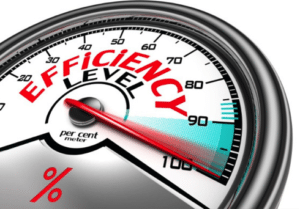 Water and wastewater utilities across the country face common challenges. These include rising costs, aging infrastructure, increasingly stringent regulatory requirements, population changes, and a rapidly changing workforce. While many utilities find themselves turning from one urgent priority to the next, others have implemented effective operational efficiency initiatives that have helped them enhance the stewardship of their infrastructure, improve performance in many critical areas, and respond to current and future demands. Improved efficiency is not just beneficial to a utility’s bottom line – it benefits everyone in a community.
Water and wastewater utilities across the country face common challenges. These include rising costs, aging infrastructure, increasingly stringent regulatory requirements, population changes, and a rapidly changing workforce. While many utilities find themselves turning from one urgent priority to the next, others have implemented effective operational efficiency initiatives that have helped them enhance the stewardship of their infrastructure, improve performance in many critical areas, and respond to current and future demands. Improved efficiency is not just beneficial to a utility’s bottom line – it benefits everyone in a community.
Infrastructure Stability
Utilities who implement operational efficiency understand the condition of and costs associated with critical infrastructure assets. This allows them to maintain and enhance the condition of their infrastructure over the long-term at the lowest possible life-cycle cost consistent with customer, community, anticipated growth, and system reliability goals. Efficient utility management assures infrastructure repair, rehabilitation, and replacement projects are coordinated in order to minimize disruptions in service or other negative consequences.
Enhanced Employee Leadership Development
 A common problem facing many utilities today is a retiring work force. By implementing operational efficiency now, utilities can recruit and retain a workforce that is competent, adaptive, and correctly trained to take on leadership roles of their own. Through communication and effective training, utility owners and operators can create an organization focused on continual learning and improvement. This ensures employee knowledge is retained and improved upon. Over time, senior knowledge and best practices will be passed along to promote a well-coordinated senior leadership team who understands their system and the needs of its customers.
A common problem facing many utilities today is a retiring work force. By implementing operational efficiency now, utilities can recruit and retain a workforce that is competent, adaptive, and correctly trained to take on leadership roles of their own. Through communication and effective training, utility owners and operators can create an organization focused on continual learning and improvement. This ensures employee knowledge is retained and improved upon. Over time, senior knowledge and best practices will be passed along to promote a well-coordinated senior leadership team who understands their system and the needs of its customers.
When employees or operators of water and wastewater systems are knowledgeable enough to solve problems themselves, it allows managers to focus more on the entire utility versus consistently fixing small problems. Managers are then free to focus on internal operations, better management practices, improving water and effluent quality, and other areas of priority.
Managing Reliable Data through Operational Efficiency
Coupled with excellent communication throughout utility staff, data collection is an area of operational efficiency that helps utilities meet demand and plan for the future. With the collection of accurate, reliable data and the tools to analyze the information, utilities can prioritize actions and capitalize on their efforts. This allows them to understand the demands of their service areas and ensure sufficient supply is available. By more efficiently identifying contributors to non-revenue water, such as system leaks, aging assets, and unauthorized usage, utilities can reduce operational expenses and uncover new revenue streams. They can also provide their customers with access to that same set of information, making it possible for them to understand and manage their consumption. This delivers benefits to the entire organization, including billing, customer service, operations, engineering, and distribution, and empowers utilities to address conservation and revenue opportunities.
Reduced Vulnerability to Climate Changes
 Some practices that utilities are implementing greatly help to improve resiliency and reduce vulnerability to an ever changing climate. Internal practices and initiatives such as energy conservation, solar energy, and utilizing heat transformed into energy from sewage and digestion have helped utilities rely less on the grid and more on their own operations. This is especially beneficial considering the ever-increasing price of energy. Reducing energy use significantly lowers operational costs for utilities – freeing up dollars for future initiatives or infrastructure improvements. Utilities who practice operational efficiency understand that making internal practices more efficient results in the entire distribution system becoming more efficient.
Some practices that utilities are implementing greatly help to improve resiliency and reduce vulnerability to an ever changing climate. Internal practices and initiatives such as energy conservation, solar energy, and utilizing heat transformed into energy from sewage and digestion have helped utilities rely less on the grid and more on their own operations. This is especially beneficial considering the ever-increasing price of energy. Reducing energy use significantly lowers operational costs for utilities – freeing up dollars for future initiatives or infrastructure improvements. Utilities who practice operational efficiency understand that making internal practices more efficient results in the entire distribution system becoming more efficient.
All Around Flexibility for Utilities
Practicing operational efficiency can greatly improve all around flexibility for water and wastewater systems. Knowing your distribution system and operating it to your specific community’s needs is a huge advantage in dealing with costly dilemmas that occur with infrastructure. In places that see seasonal spikes in water usage, operational efficiency allows a utility to adjust and operate more effectively during peak times as well as during the “off-season.” Practicing operational efficiency also allows a utility to better deal with issues in their distribution system without disrupting service to customers.
In Conclusion
To meet continually increasing challenges, utilities must become more efficient in the way they manage their resources, address demands on their infrastructure, and monitor data throughout their systems. The implementation of improved operational efficiency helps utilities ensure ongoing, timely, cost-effective, reliable, and sustainable performance improvements in all facets of its operations.
